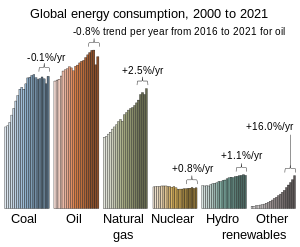
Back استهلاك عالمي للطاقة Arabic বিশ্ব শক্তি সরবরাহ এবং ব্যবহার Bengali/Bangla Consum i recursos energètics a nivell mundial Catalan Světová nabídka a spotřeba energie Czech Verdens energiforbrug Danish Weltenergiebedarf German Consumo y recursos energéticos a nivel mundial Spanish Energia-kontsumo Basque عرضه و مصرف انرژی در جهان Persian Energiankulutus maailmassa Finnish


World energy supply and consumption refers to the global supply of energy resources and its consumption. The system of global energy supply consists of the energy development, refinement, and trade of energy. Energy supplies may exist in various forms such as raw resources or more processed and refined forms of energy. The raw energy resources include for example coal, unprocessed oil & gas, uranium. In comparison, the refined forms of energy include for example refined oil that becomes fuel and electricity. Energy resources may be used in various different ways, depending on the specific resource (e.g. coal), and intended end use (industrial, residential, etc.). Energy production and consumption play a significant role in the global economy. It is needed in industry and global transportation. The total energy supply chain, from production to final consumption, involves many activities that cause a loss of useful energy.[3]
As of 2022, energy consumption is still about 80% from fossil fuels.[4] The Gulf States and Russia are major energy exporters. Their customers include for example the European Union and China, who are not producing enough energy in their own countries to satisfy their energy demand. Total energy consumption tends to increase by about 1–2% per year.[5] More recently, renewable energy has been growing rapidly, averaging about 20% increase per year in the 2010s.[6][7]
Two key problems with energy production and consumption are greenhouse gas emissions and environmental pollution. Of about 50 billion tonnes worldwide annual total greenhouse gas emissions,[8] 36 billion tonnes of carbon dioxide was a result of energy use (almost all from fossil fuels) in 2021.[9] Many scenarios have been envisioned to reduce greenhouse gas emissions, usually by the name of net zero emissions.
Per capita, energy consumption in North America is very high, while in less developed countries it is low and usually more renewable.[10][11] There is a clear connection between energy consumption per capita, and GDP per capita.[12]
A significant lack of energy supplies is called an energy crisis.
- ^ Jackson RB, et al. (2022). "Global fossil carbon emissions rebound near pre-COVID-19 levels". Environmental Research Letters. 17 (3): 031001. arXiv:2111.02222. Bibcode:2022ERL....17c1001J. doi:10.1088/1748-9326/ac55b6. S2CID 241035429. Retrieved 22 May 2022.
- ^ "Energy consumption by source". Our World in Data. Retrieved 12 January 2024.
- ^ "Energy definitions". Archived from the original on 5 July 2023. Retrieved 16 August 2023.
- ^ "World Energy Statistics | Enerdata". Yearbook.enerdata.net. Archived from the original on 23 August 2022. Retrieved 26 August 2022.
- ^ Ritchie, Hannah; Roser, Max; Rosado, Pablo (28 November 2020). "Energy". Our World in Data. Archived from the original on 16 April 2023. Retrieved 16 September 2022.
Global energy consumption continues to grow, but it does seem to be slowing – averaging around 1% to 2% per year.
- ^ "Global wind and solar growth on track to meet climate targets". Reuters. 31 March 2022. Archived from the original on 16 April 2023. Retrieved 16 September 2022.
- ^ "Global Electricity Review 2022". Ember. 29 March 2022. Archived from the original on 2 April 2022. Retrieved 16 September 2022.
- ^ Ritchie, Hannah; Roser, Max; Rosado, Pablo (11 May 2020). "CO₂ and Greenhouse Gas Emissions". Our World in Data. Archived from the original on 3 August 2020. Retrieved 5 September 2022.
- ^ "Global CO2 emissions rebounded to their highest level in history in 2021 - News". IEA. 8 March 2022. Archived from the original on 15 August 2022. Retrieved 5 September 2022.
- ^ "Energy use per person". Archived from the original on 28 November 2020. Retrieved 9 September 2022.
- ^ "Renewable energy consumption (% of total final energy consumption) | Data".
- ^ "Energy use per person vs. GDP per capita, 2021". Our World in Data.
© MMXXIII Rich X Search. We shall prevail. All rights reserved. Rich X Search